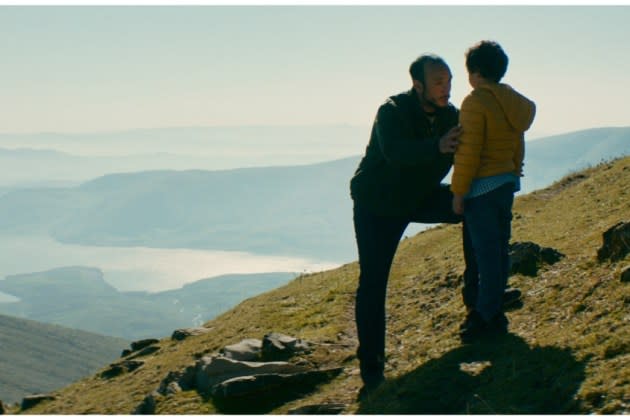‘Behind the Mountains’ Review: Unpredictable Tunisian Oddity Blends Social Realism With the Ability to Fly
- Oops!Something went wrong.Please try again later.

Catatonic with a bright red swollen eye, middle-aged Rafik (Majd Mastoura) sits handcuffed inside a police station in the aftermath of a violent outburst at his soul-crushing office job. Whatever gripe eroded his sanity doesn’t matter as much now, since the incident, including a suicide attempt, unearthed a supernatural ability he possesses. An unpredictable oddity of a film, “Behind the Mountains” sees seasoned Tunisian writer-director Mohamed Ben Attia step away from the straightforward social realist drama of his previous festival standouts “Dear Son” and “Hedi,” while staying steadfast in his interest for emotionally intricate protagonists and the complications of parent-child relationships.
Four years after the breakdown that landed him in prison, Rafik kidnaps his son Yassine (Walid Bouchhioua), an impressionable grade-school kid who barely remembers his father, and drives away from the capital and into the open spaces of the mountainous countryside. In brief exchanges, we learn of Rafik’s history with mental health issues and his inability to live up to the financial standards of his well-off in-laws. Forcing us to witness the consequences of his newly discovered power before we even learn what it is, editor Lenka Fillnerova cuts away right before Rafik displays it, and later brings us back to the scene in the form of brief flashbacks that imply he can fly when he jumps off of a cliff.
More from Variety
Entranced by Rafik’s feat, a nameless young shepherd (Samer Bisharat) chooses to follow him, like a disciple of sorts. It’s in this quiet rural man that the protagonist finds the most tenderness and unconditional trust, even as the journey veers into criminal activity. The trio sets out to make a new home behind a dragon-shaped mountain range, but Ben Attia derails their plan as various twists prevent us from ever guessing with certainty what comes next. That’s especially true when Rafik and his two companions break into the home of Wejdi (Helmi Dridi) and Najwa (Selma Zghidi), a wealthy married couple.
Once the dust has settled and all parties have agreed to remain amicable until morning, the three men from distinct segments of the social strata who otherwise may have never crossed paths — a rural laborer, an urban paper-pusher and a financially successful model father — sit together in the living room in a tense, coerced gathering. Najwa, the matriarch worried about her two young children in the house, begins scheming a way out of this home invasion.
Through lines of dialogue, Ben Attia unveils key details about both the captors and the hostages, practically all of who feel just as trapped in their lives as Rafik did at the outset (a revelation that flips the dynamic between them on its head). Early on, DP Frédéric Noirhomme frames the characters in extreme wide shots that dwarf them against the vastness of the imposing landscapes. But once the narrative moves indoors, the tight rooms augment the sense of imprisonment Raifk so desperately wants to free himself from.
Operating from a nothing-to-lose attitude, a fierce Mastoura pieces together his portrayal of Rafik with layers of determined rage, tender parental instincts toward Yassine, and a strength gained from the realization that perhaps there could be something more beyond what people collectively accept as a fulfilled life. After playing a meek man living under his protective mother’s shadow in “Hedi,” the actor reunites with Ben Attia here. Both characters share a desire to break away from societal conventions. The filmmaker effectively positions Zghidi’s anxious Najwa as a person receptive to Rafik’s logic-defying claim that he can take flight. She too wishes to escape.
Flying serves as a metaphor for existential liberation in “Behind the Mountains.” But thanks to Ben Attia’s shrewd sensibilities, its visual potency feels distinct from superhero blockbusters. Rafik has no interest in utilizing his unexpected potential for any grand, universe-altering purpose, and yet, the mere fact that he can do something no one thought possible allows others to experience personal epiphanies about the rigidness of the status quo and their seemingly unchangeable position in the world.
Ben Attia keeps these musings oblique, and, to the benefit of the film’s mystique, refuses to engage with the mechanics of Rafik’s superpower or with its source. Instead, he commits to what it evokes in him and those around him, particularly in Yassine, for whom the flying is a literal leap of faith and validation that his father is more than the negative stories he’s heard all his young life. Unorthodox, yet fascinating, “Behind the Mountains” is mostly concerned with passing on the inspiring idea that it only takes one person to believe things can be different for change to begin.
Best of Variety
Sign up for Variety’s Newsletter. For the latest news, follow us on Facebook, Twitter, and Instagram.
